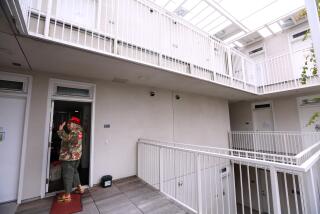EARTHQUAKE / THE LONG ROAD BACK : Senate Committee OKs Sales Tax Hike : Revenue: Bill would increase levy by a quarter-cent for 26 months to help fund quake relief efforts. It is opposed by Wilson Administration.
- Share via
SACRAMENTO — Over opposition from the Wilson Administration, a legislative committee Thursday approved fast-track legislation authored by Assembly Speaker Willie Brown that would impose a $1.5-billion sales tax increase to help repair damage from the Northridge earthquake. Similar to a law enacted after the 1989 Loma Prieta earthquake, the new bill would add a tax of one-quarter of a cent on the dollar starting March 1. It would expire April 30, 1996.
The Senate Revenue and Taxation Committee approved the proposal by a 6-1 margin over Republican opposition, but it faces a rough road ahead without Republican Gov. Pete Wilson’s support. It needs a two-thirds favorable vote of both the Senate and Assembly, which can occur only with GOP backing.
Brown and Senate President Pro Tem Bill Lockyer (D-Hayward) indicated, however, that a compromise likely would evolve. Each said he would vote for virtually any plan that could win two-thirds approval.
Other options under discussion include submitting a major bond issue to voters, a gasoline tax increase for highway repairs, or possibly some combination of all three. Brown said he wants a sales tax because it would produce extra revenue immediately for reconstruction.
The action represented the first significant step that the Legislature has taken to help finance the recovery efforts. Statewide, the sales tax currently varies from a low of 7.25% to a high of 8.5%, depending on local sales tax rates.
Wilson, who is running for reelection, has refused to commit himself to a state earthquake recovery program because firm government estimates of the massive damage have not been completed and it is unknown how much emergency aid the federal government will provide.
In Washington on Thursday, the House approved $8.6 billion in federal earthquake aid for California. Funds from the Brown bill would augment the federal assistance and be spent on a variety of services, ranging from housing and transit facilities to public schools and colleges.
Steve Olsen, deputy director of the state Department of Finance, reiterated Wilson’s position to the Democratic-dominated committee Thursday. He said it would be premature to approve the tax bill.
Brown disagreed, saying the Legislature must move swiftly to get a recovery program ready for implementation when damage estimates are final.
In an indirect criticism of Wilson, he told reporters, “It makes no sense 17 days after the quake for the state government to have done nothing except accept photo ops.”
Recalling the cooperation in 1989 between the Legislature and GOP Gov. George Deukmejian in quickly enacting a sales tax increase after the Loma Prieta disaster in Northern California, Brown said Deukmejian “just responded as human beings would respond. He did not weigh the political ups or downs.
“Gov. Wilson is probably more sensitive to the politics than George Deukmejian was,” Brown said, noting that Deukmejian was not running for reelection at the time.
Brown’s bill, hastily fashioned Monday from another bill that dealt with bank and corporation taxes, had proposed a half-cent increase in the sales tax for 13 months. But the committee reduced it to a quarter-cent for 26 months, chiefly because a new poll shows the public is more favorable to a smaller increase that would be spread over a longer period.
Freshman Sen. Tom Campbell (R-Stanford) argued for delaying action until there are more definitive damage estimates and until decisions are made on whether certain labor-backed laws should be relaxed during the rebuilding process.
Campbell told Brown, “I might support the bill and I might not support the bill . . . I have not yet heard from the governor’s office.”
The remark infuriated Sen. Tom Hayden (D-Santa Monica), whose constituents suffered heavy losses. “To say that you are not for it, but want to be clear you are not against any of these measures is not a profile in the kind of leadership we need,” Hayden scolded Campbell. “To say you want to wait for him into another week is to beg the question of leadership.”
All five of the committee’s Democrats and an independent, Sen. Quentin Kopp of San Francisco, voted for the bill. Campbell abstained while Republican Sen. Rob Hurtt of Garden Grove voted against it. Hurtt said he favored cutting the state budget rather than raising the tax.
A hike of a quarter-cent would raise the sales tax in Los Angeles to 8 1/2 cents on the dollar.
More to Read
Get the L.A. Times Politics newsletter
Deeply reported insights into legislation, politics and policy from Sacramento, Washington and beyond. In your inbox three times per week.
You may occasionally receive promotional content from the Los Angeles Times.










